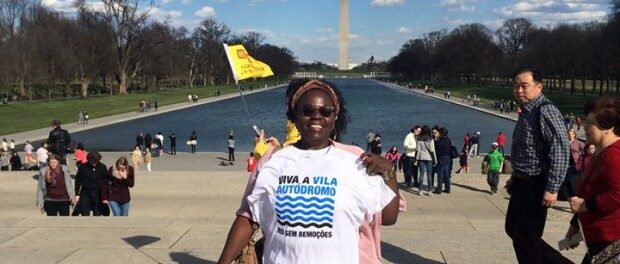
This is a letter from Heloisa Helena Costa Berto/Luizinha de Nanã of Vila Autódromo to Mr. Ulrik Halsteen, member of the Business and Human Rights working group of the United Nations Office of the High Commissioner on Human Rights.
It is with regret that I write again to this Human Rights Commission.
I am a resident who was removed from Vila Autódromo, the locale where the Olympic Park is being built. In my last report I implored the UN to intervene in the cases of abuse, threats and violence that are taking place in Vila Autódromo.
I am writing again as a citizen who has suffered death threats and who has had my Afro-Brazilian religious house, of which I was a guardian, demolished less than a month ago. As well as this I had my morale destroyed by slander and I was publicly humiliated by municipal employees during the demolition when my belongings were called trash.
Today I live from charity with my possessions scattered between my friends’ homes. I am being forced to give away my animals. The Rio de Janeiro city government has left me on the street.
The Brazilian courts say they have no idea when I will receive compensation and an agreement hasn’t even been negotiated. What I had requested was to be resettled and to receive a small amount of compensation that was stipulated for the improvements, having been evaluated by the City’s specialists so I could rebuild my home.
I have physical problems. As well as these problems, today I face profound depression and panic attacks.
This is the third time I am writing the UN. I have already sent two reports. As fate would have it, I am in the United States, in Washington, DC. I would like to be heard by the UN so I can state my case with videos and photos that prove my statements.
I appeal to the UN since my country has international agreements that should ensure my protection, and that of many others who unfortunately go through the same situation in Vila Autódromo. Over the years, the Brazilian state has signed international treaties and agreements and made commitments to other nations that consider various human rights issues. In addition, Brazilian citizens are subject to international law that procedurally requires the promotion and enforcement of human rights along with international protection bodies.
Brazil is a signatory to the following international treaties and conventions on human rights that establish rules concerning the right to religion, land, housing and property:
- Universal Declaration of Human Rights, 1948;
- International Covenant on Social, Economic and Cultural Rights, 1966;
- International Covenant on Civil and Political Rights, 1966;
- International Convention on the Elimination of All Forms of Racial Discrimination, 1965;
- Declaration on Race and Racial Prejudice, 1978;
- The Vancouver Declaration on Human Settlements, 1976;
- Agenda 21 on Environment and Development, 1992;
- The Habitat Agenda, 1996; and
- American Convention on Human Rights, 1969.
The evictions and displacements that have occurred and are occurring today in the city of Rio de Janeiro are serious human rights violations, in particular the right to adequate housing, according to the UN Human Rights Commission resolution 1993/77.
In the same text, it states that there should be legal appeals aimed at preventing removals or demolitions planned by the courts’ issued warrants and legal proceedings for compensation after the occurrence of an illegal removal.
Nothing further and hoping for a response.
Heloisa Helana

